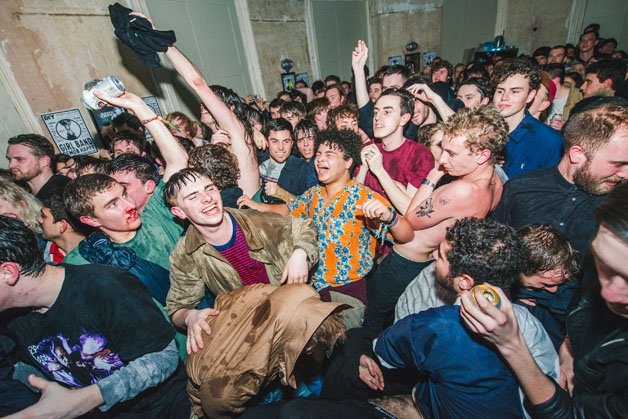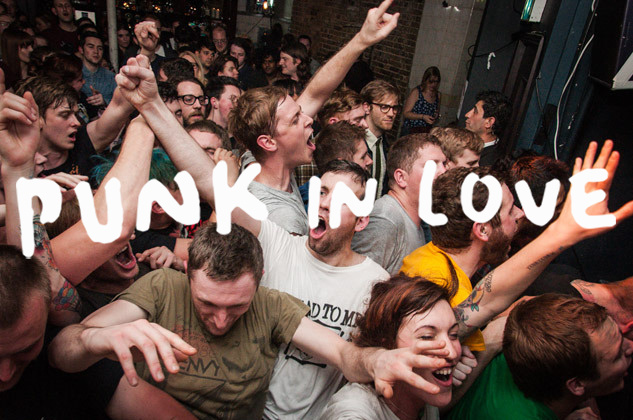You only have to look at the Download and Reading & Leeds lineup's to see that alternative music is not only dominated by men, but entirely unashamed about it. These are plenty of places for boys in bands to thrust and flail while aggressive kids beat the crap out of each other. And there are few other areas of modern life where such a gender disparity would continue unremedied. Unsurprisingly, in a world dominated by men, the minority of women in the scene all have first hand experience of industry-related sexism. Last year, Alanna McArdle of Joanna Gruesome hit out at the mosh pits she’d witnessed injuring and endangering people (particularly women) at her band’s shows, describing the culture as “a macho and archaic throwback."Alongside sexual harassment and groping, the violence and unconsenting nature of mosh pits are bound to make some women feel unsafe in such environments. Of course, there are girls who give as hard as they get, smashing grizzly rockers skulls together all for the fun of it, but there also women and men who find the atmosphere at a punk gig, for all intents and purposes, no different to lad culture at its most toxic. Any outsider who isn’t prepared to conform with its awful, hypermasculine bullshit is treated with hostility.Misogyny is rife in music across all levels, from consumption to performance to business and marketing. PRS for Music report of the 95,000 songwriters and composers they represent, only 13 per cent are female. AIM's 2012 membership survey revealed that only 15% of label members are majority-owned by women. But it's particularly disappointing that this is the case in alternative music, because these scenes claim to be the most open and unprejudiced. Yet they often end up being the biggest perpetrators, possibly as a direct result of their stance rendering them blind to the problems in their own ranks.I don’t want to say there’s a flipside to this, because to do so is to trivialise the far more pressing issue of the sexism inherent in music. But the truth is that loud music does provide a rare space in which men who would normally rather die than talk about their feelings, are able to expose some pretty deep emotions within their songs. It’s by no means limited to any particular genre, but it does seem that there’s something about surrounding oneself with such energy and noise that makes confessional lyrics easier to spout.Last year, I wrote an article about how a stiff upper lip attitude to masculinity was literally killing men, exploring the devastating effect social constructs of gender can have. I had read a Samaritans report which concluded that while women talk about their problems, “the 'healthy' ways men cope are using music or exercise”, and noted that higher rates of alcoholism in men were linked to our tendency to self-medicate. I made the idealistic but wholly unrevolutionary suggestion that men need to learn to open up and talk. I still think widespread emotional communication would be neat, but as it has not been forthcoming, men will continue to deal with their issues in the ways they always have. As a notable part of this, how does music function as a coping mechanism? And how does the inherent masculinity of such environments aid this? When I’m looking to music as a means of emotional relief, I’ll usually go for a sound characterised by distorted guitars and shouty vocals; a superficial tendency towards aesthetic above all else. I mean, I love Deafheaven to bits, but listening to Sunbather for the lyrics is this decade’s reading Playboy for the articles. There needs to be some sort of sense of power that you can latch onto, and this as a most basic sonic concept can only exist in the upbeat and energetic, otherwise you risk slipping into a state of apathetical misery. Of course, it doesn’t have to be tied to a particular genre but if the songs are slow and melancholic you’re quite clearly not gonna get that catharsis. Beautiful though it may be, you just don’t get the same kick from coming home after a shitty day and throwing on Grouper’s Dragging A Dead Deer Up A Hill.There’s a real sense of catharsis in loud, angry music, and like it or not, it’s linked pretty heavily to masculinity, particularly in vocal performances. If a man is making noises like Fucked Up’s Damian does, it’s seen as something pretty powerful. If a woman relays any anger in her vocals, she can be quite safe in the knowledge critics will deem her shrill and overemotional, and they’re encouraged to avoid anything along these lines. While a few do achieve popularity (Perfect Pussy’s Meredith Graves is a good example), women who scream or shout in their music just don’t tend to get the same recognition as men who do the same, and so, by association, this becomes something perceived as fairly masculine.A few months ago, I was listening to The Monitor, the very good second album by the very good band Titus Andronicus. About 20 minutes in I began to feel the unmistakable sensation of that first glorious beer on a Friday evening working its way through my bloodstream to my brain, a slight lightheadedness and lowering of inhibitions. Given that I hadn’t been drinking, this probably should have been of some concern and under different circumstances I might have let WebMD convince me I was definitely having a stroke and several cancers.But there was a familiarity to the feeling that told me I was safe. Hitting play on The Monitor had been twinned with cracking open a can so many times before, the phantom tipsyness could quite easily be attributed to a sort of classical conditioning. Essentially, I had become a pissed, poorly groomed, adult male human version of Pavlov’s dog which when you put it like that actually sounds kind of badass. I wasn’t worried about the deep-seated psychological issues or what it said about my relationship with alcohol (I’m saving any notion of self improvement for my forties) but I did wonder how the album had become so closely tied to drinking.It could be traced back, I concluded, to a period of my life when I worked a real job in an office and dealt with all the associated bullshit of working a real job in an office. On stressful days, I would come home via the corner shop, put the album on loud and drink and shout along until I wasn’t angry anymore. For much of the past five years since its release, The Monitor has been my go-to record when in need of catharsis, and I don’t know whether it’s testament to the music itself or an indictment of my shitty state of mind that it’s by far the most played album in my library. Either way, this whole thing seemed to provide a nice rounded bit of ammunition to the Samaritans’ point about how men find solace in alcohol and music.
When I’m looking to music as a means of emotional relief, I’ll usually go for a sound characterised by distorted guitars and shouty vocals; a superficial tendency towards aesthetic above all else. I mean, I love Deafheaven to bits, but listening to Sunbather for the lyrics is this decade’s reading Playboy for the articles. There needs to be some sort of sense of power that you can latch onto, and this as a most basic sonic concept can only exist in the upbeat and energetic, otherwise you risk slipping into a state of apathetical misery. Of course, it doesn’t have to be tied to a particular genre but if the songs are slow and melancholic you’re quite clearly not gonna get that catharsis. Beautiful though it may be, you just don’t get the same kick from coming home after a shitty day and throwing on Grouper’s Dragging A Dead Deer Up A Hill.There’s a real sense of catharsis in loud, angry music, and like it or not, it’s linked pretty heavily to masculinity, particularly in vocal performances. If a man is making noises like Fucked Up’s Damian does, it’s seen as something pretty powerful. If a woman relays any anger in her vocals, she can be quite safe in the knowledge critics will deem her shrill and overemotional, and they’re encouraged to avoid anything along these lines. While a few do achieve popularity (Perfect Pussy’s Meredith Graves is a good example), women who scream or shout in their music just don’t tend to get the same recognition as men who do the same, and so, by association, this becomes something perceived as fairly masculine.A few months ago, I was listening to The Monitor, the very good second album by the very good band Titus Andronicus. About 20 minutes in I began to feel the unmistakable sensation of that first glorious beer on a Friday evening working its way through my bloodstream to my brain, a slight lightheadedness and lowering of inhibitions. Given that I hadn’t been drinking, this probably should have been of some concern and under different circumstances I might have let WebMD convince me I was definitely having a stroke and several cancers.But there was a familiarity to the feeling that told me I was safe. Hitting play on The Monitor had been twinned with cracking open a can so many times before, the phantom tipsyness could quite easily be attributed to a sort of classical conditioning. Essentially, I had become a pissed, poorly groomed, adult male human version of Pavlov’s dog which when you put it like that actually sounds kind of badass. I wasn’t worried about the deep-seated psychological issues or what it said about my relationship with alcohol (I’m saving any notion of self improvement for my forties) but I did wonder how the album had become so closely tied to drinking.It could be traced back, I concluded, to a period of my life when I worked a real job in an office and dealt with all the associated bullshit of working a real job in an office. On stressful days, I would come home via the corner shop, put the album on loud and drink and shout along until I wasn’t angry anymore. For much of the past five years since its release, The Monitor has been my go-to record when in need of catharsis, and I don’t know whether it’s testament to the music itself or an indictment of my shitty state of mind that it’s by far the most played album in my library. Either way, this whole thing seemed to provide a nice rounded bit of ammunition to the Samaritans’ point about how men find solace in alcohol and music. As I established, the music itself carries a lot of power, but bands like Titus Andronicus are even more vital because of their lyrics. The writing is an outlet for the writer, certainly, but more than this, it’s a lifeline for the listener. The sound of The Monitor drew me in, but the words of Patrick Stickles are what made it such a remarkable and enduring album. He tackles themes of emasculation, self-destruction, mental illness and medication, and a general sense of worthlessness with an honesty so brutal it avoids what could so easily edge into melodrama. He even addresses the difficulty of communication and the evasion of talking in favour of drinking (“So let's get fucked up, and let's pretend we're all okay / If you've got something that you can't live with save it for another day”).The key thing here is the power of relatability. For men, so little important conversation is had between friends, particularly in their teens and early twenties. They struggle alone, not realising those closest to them are dealing with similar problems, which they almost certainly are because to be honest youth is kind of shitty for most people in some way. But if you haven’t yet come to terms with this, music brings solace because so much of the good stuff is centred on feeling like a bit of a fuck-up.An album like The Monitor, themed loosely around the American Civil War and documenting life in small town New Jersey, has no ostensible relatability for a kid from Loughborough - but there’s a universality to the lyrics and the cultural and geographical differences just serve to highlight the fact that anyone, anywhere can feel like this. It can’t replace actually talking as a means of dealing with your problems, but it can make you see that you’re far from alone: and sometimes that can be all you need to make life worth pushing on with.In an ideal world, masculinity as a social construct wouldn’t exist, and we wouldn’t have a music industry that was utterly shit for at least half the population. Maybe we’ll get there one day. But in the meantime, if this overly-macho bullshit is saving a few lives, then I guess that’s at least one thing for which to be grateful.Follow Jack on Twitter.This week on Noisey UK, we’re going to be celebrating the best of punk, emo and hardcore in our new editorial series Punk In Love. Follow all the content here.
As I established, the music itself carries a lot of power, but bands like Titus Andronicus are even more vital because of their lyrics. The writing is an outlet for the writer, certainly, but more than this, it’s a lifeline for the listener. The sound of The Monitor drew me in, but the words of Patrick Stickles are what made it such a remarkable and enduring album. He tackles themes of emasculation, self-destruction, mental illness and medication, and a general sense of worthlessness with an honesty so brutal it avoids what could so easily edge into melodrama. He even addresses the difficulty of communication and the evasion of talking in favour of drinking (“So let's get fucked up, and let's pretend we're all okay / If you've got something that you can't live with save it for another day”).The key thing here is the power of relatability. For men, so little important conversation is had between friends, particularly in their teens and early twenties. They struggle alone, not realising those closest to them are dealing with similar problems, which they almost certainly are because to be honest youth is kind of shitty for most people in some way. But if you haven’t yet come to terms with this, music brings solace because so much of the good stuff is centred on feeling like a bit of a fuck-up.An album like The Monitor, themed loosely around the American Civil War and documenting life in small town New Jersey, has no ostensible relatability for a kid from Loughborough - but there’s a universality to the lyrics and the cultural and geographical differences just serve to highlight the fact that anyone, anywhere can feel like this. It can’t replace actually talking as a means of dealing with your problems, but it can make you see that you’re far from alone: and sometimes that can be all you need to make life worth pushing on with.In an ideal world, masculinity as a social construct wouldn’t exist, and we wouldn’t have a music industry that was utterly shit for at least half the population. Maybe we’ll get there one day. But in the meantime, if this overly-macho bullshit is saving a few lives, then I guess that’s at least one thing for which to be grateful.Follow Jack on Twitter.This week on Noisey UK, we’re going to be celebrating the best of punk, emo and hardcore in our new editorial series Punk In Love. Follow all the content here.
Advertisement
Advertisement

Advertisement
Advertisement

Advertisement
